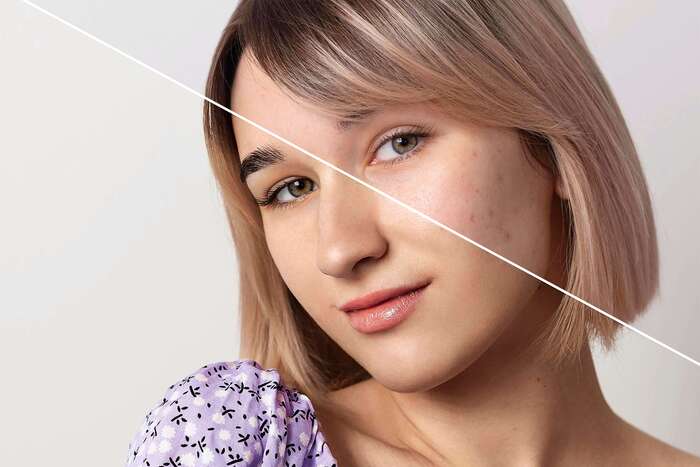Dealing with acne as an adult can be frustrating – wasn’t this supposed to be a teenage problem? But fear not, adult acne is more common than you think, and there are plenty of ways to tackle it head-on.
From tried-and-true skincare routines to lifestyle changes and professional treatments, there’s a whole arsenal of weapons at your disposal in the battle against those pesky pimples.
First things first, let’s talk about skincare.
- A gentle yet effective skincare routine can work wonders for adult acne. Start by cleansing your face twice daily with a mild cleanser that’s specifically formulated for acne-prone skin.
- Search for ingredients like salicylic acid or benzoyl peroxide. They can clear pores and reduce redness.


And don’t forget to moisturize
– yes, even oily skin needs hydration! Opt for a non-comedogenic moisturizer to keep your skin balanced and hydrated without clogging pores.
- Next up, exfoliation. Regular exfoliation can help slough off dead skin cells, prevent clogged pores, and promote cell turnover – all essential for keeping acne at bay.
- But be gentle! Over-exfoliating can irritate the skin and exacerbate acne, so stick to exfoliating no more than 2-3 times a week, and choose a gentle exfoliant that won’t irritate.
Now let’s talk about spot treatments.
When those inevitable breakouts do happen, having a reliable spot treatment on hand can be a game-changer. Look for products containing ingredients like benzoyl peroxide, salicylic acid, or sulfur, which can help target acne-causing bacteria and reduce inflammation. You can also try Accutane tablets. Just dab a small amount onto the affected area before bed, and let it work its magic overnight.
- But skincare is only part of the equation when it comes to treating adult acne. Lifestyle factors can also play a significant role in acne development.
- Stress, lack of sleep, poor diet, and hormonal fluctuations can all contribute to breakouts, so it’s essential to take care of your overall health and well-being.
- Make time for self-care activities that help you relax and de-stress, prioritize getting enough sleep each night, and fuel your body with nutritious foods that support skin health.
- Of course, sometimes skincare and lifestyle changes alone aren’t enough to tackle stubborn adult acne. In cases of severe or persistent acne, it may be time to bring in the big guns – professional treatments.
- Dermatologists have a whole arsenal of treatments at their disposal, from prescription-strength topical medications to in-office procedures like chemical peels, laser therapy, and microdermabrasion.
- If you’re struggling to get your acne under control, don’t hesitate to seek help from a dermatologist who can tailor a treatment plan to your specific needs.
Diet and Nutrition:
- What you eat can directly impact your skin health. While there’s no one-size-fits-all diet for acne, some studies suggest that certain foods may exacerbate breakouts in some individuals.
- Foods with a high glycemic index, such as sugary snacks and refined carbohydrates, can spike blood sugar levels and potentially contribute to acne flare-ups.
- On the other hand, incorporating more fruits, vegetables, lean proteins, and healthy fats into your diet can provide essential nutrients that support skin health.
Hormonal Factors:
- Hormonal fluctuations can wreak havoc on your skin, especially for women. Fluctuations in hormone levels, such as those that occur during menstruation, pregnancy, or menopause, can trigger acne breakouts.
- Hormonal acne typically manifests as deep, cystic lesions along the jawline, chin, and cheeks. In these cases, hormonal treatments like oral contraceptives (birth control pills) or spironolactone may be prescribed by a dermatologist to help regulate hormone levels and reduce acne severity.
Avoiding Irritants:
- Harsh skincare products and environmental factors can exacerbate acne and irritate sensitive skin.
- Avoid using products containing alcohol, fragrances, and harsh detergents, as these can strip the skin of its natural oils and disrupt the skin barrier, leading to increased inflammation and breakouts.
- Opt for gentle, non-comedogenic products that won’t clog pores or cause irritation.
Sun Protection:
- While it’s tempting to soak up the sun in hopes of drying out acne lesions, unprotected sun exposure can actually worsen acne and cause long-term damage to the skin.
- UV radiation can trigger inflammation and increase the risk of post-inflammatory hyperpigmentation (dark spots) and premature aging. Always wear a broad-spectrum sunscreen with an SPF of 30 or higher, even on cloudy days, and reapply every two hours when outdoors.
Stress Management:
- Stress doesn’t just take a toll on your mental well-being – it can also manifest physically in the form of acne breakouts.
- When you’re stressed, your body releases cortisol, a hormone that can stimulate oil production and inflammation in the skin, leading to increased acne severity. Incorporating stress-reduction techniques like mindfulness meditation, yoga, deep breathing exercises, or regular physical activity into your daily routine can help manage stress levels and improve overall skin health.
Patience and Consistency:
- Treating adult acne takes time and patience – there’s no overnight miracle cure. It’s essential to stick to your skincare routine consistently and give products time to work before expecting to see results.
- Be gentle with your skin, and avoid the temptation to pick or squeeze pimples, as this can lead to scarring and further inflammation. With persistence and a bit of TLC, you can achieve clearer, healthier skin over time.
- Remember, everyone’s skin is unique, so what works for one person may not necessarily work for another.
- If you’re struggling to get your acne under control despite your best efforts, don’t hesitate to seek guidance from a dermatologist who can provide personalized recommendations and treatments tailored to your specific skin type and concerns.
In conclusion, adult acne may be annoying, but it’s not something you have to live with. With the right skincare routine, lifestyle adjustments, and possibly some professional help, you can banish those breakouts and achieve the clear, radiant skin you deserve. So go ahead, face acne head-on – you’ve got this!



